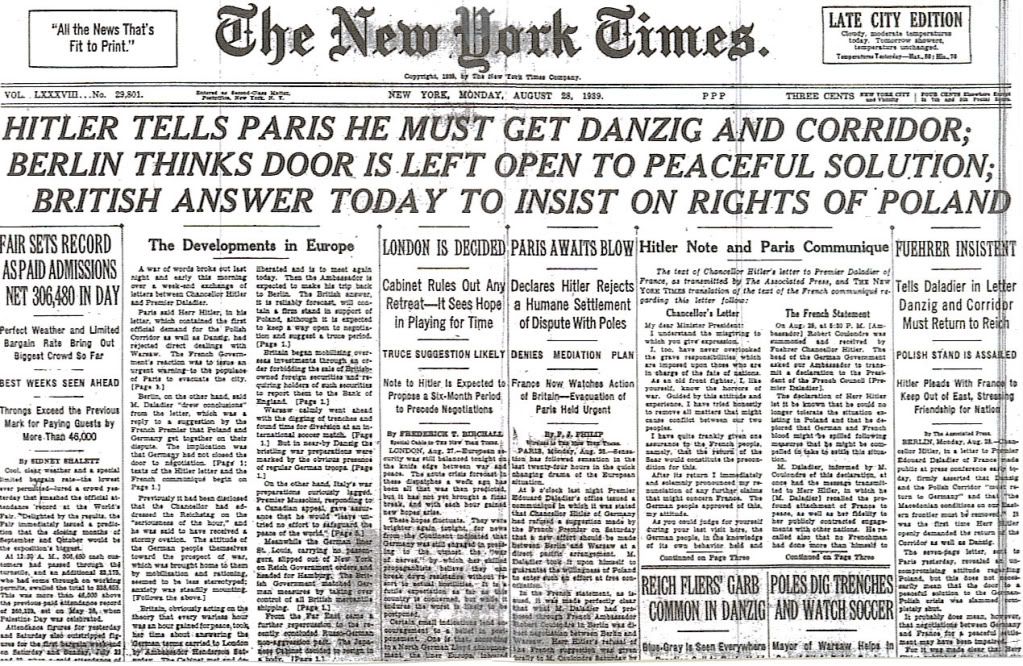
Posted on 08/28/2009 5:21:38 AM PDT by Homer_J_Simpson








On Monday, August 28, the Berliners watched troops pouring through the city toward the east. They were being transported in moving vans, grocery trucks and every other sort of vehicle that could be scraped up.
William L. Shirer, The Rise and Fall of the Third Reich
The Developments in Europe – 2
Fuehrer Insistent* – 2-4
Hitler Note and Paris Communique – 5-6
Reich Fliers’ Garb Common in Danzig – 7
Poles Dig Trenches and Watch Soccer – 8
* Attn: VaRepublican – More on the Lansing Note at image #4.
Karl Emil Klos was forced to desert from the German steamship Karnac last year, when it was discovered he had distributed leaflets defending his Roman Catholic faith against Nazi attacks.Google reveals nothing on the man.
I doubt the people reading the paper then could even imagine that it would be like this for the next six years.
“Ping to the article, 4th image from the top, bottom right, entitled “FOE OF NAZIS KIDNAPPED”. A forgotten martyr?
“Karl Emil Klos was forced to desert from the German steamship Karnac last year, when it was discovered he had distributed leaflets defending his Roman Catholic faith against Nazi attacks.
Google reveals nothing on the man.”
You are correct. Perhaps his name has an alternate spelling.
There are several ships christened Karnak.
Here is one that might fit:
“Karnak (4) 1926 built by Flensburger Schiffsbau Gesellschaft, Flensburg | 1926 to Hapag, 1940 renamed Hermes for German Navy, 1941 scuttled by own crew in South Atlantic to avoid capture.”
FROM
http://www.theshipslist.com/ships/lines/kosmos.htm
Heck most folks reading this at the time could never imagine that a year from then France would be occupied and the Luftwaffe would be bombing London.
Hitler assumed that the British and French would back down, as they had always done before.
It’s scary how things escalated so fast 70 years ago today.
What Hitler really wanted, more than Danzig and the corridor, was control of Poland's Jews and access to Russia for his planned invasion.
“13. An independent Polish state should be erected which should include the territories inhabited by indisputably Polish populations, which should be assured a free and secure access to the sea, and whose political and economic independence and territorial integrity should be guaranteed by international covenant.”
Until now the major milestones on the road to war have been seperated by at least several months.
The remilitarization of the Rhineland - March 1936
The Anschluss - March 1938
Munich - September 1938
The Sudetenland - March 1939
The Pact - August 23, 1939
From a broad perspective the escalation has been slow and methodical. The apparent acceleration of events now is sort of like a dam that has been leaking for a long time and suddenly gives way.
There was a question a few days ago about the Lansing note. The story today provides all of the details.
And, again a Polish provocation - a food blockade of the free city.
Uhm, yes, thank you. I was making a joke concerning the band “Danzig” which was, in at least lyrics, overtly evil.
...and it seems that the dam is about to give. :)
Well in all fairness I think that people couldn’t imagine that France would be occupied on May 9th 1940.
Sigrid Schultz from the Chicago Tribune reporting from Berlin
“On Monday, August 28, the Berliners watched troops pouring through the city toward the east. They were being transported in moving vans, grocery trucks and every other sort of vehicle that could be scraped up.”
One of the enduring myths of WW2 is that the Wehrmacht was some sort of mechanized juggernaut that rolled over its foes with an overwhelming number of machines. Not true. The Wehrmacht was actually one of the less mobile of all modern armies. The French, British and of course the Americans had far larger motor pools. The American army decided in the early 1930’s that all artillery would be motor transported. By 1944, you could include the Red Army in that category, thanks to the hundreds of thousands of lend-lease trucks provided by America and Canada.
The bulk of German infantry marched, the soup kitchens, supply vehicles and even artillery was horse drawn. It remained that way during the war. In fact, as Albert Seaton noted in “The Russo-German War” chapter “Germany at Bay:”
“By 1944, the German Army was one of the poorer armies of the world.”
forgotten martyr. wow.
As usual, an absorbing and compelling read. Thanks for this daily post.
Will history repeat itself on our shores. I PRAY not!
Disclaimer: Opinions posted on Free Republic are those of the individual posters and do not necessarily represent the opinion of Free Republic or its management. All materials posted herein are protected by copyright law and the exemption for fair use of copyrighted works.